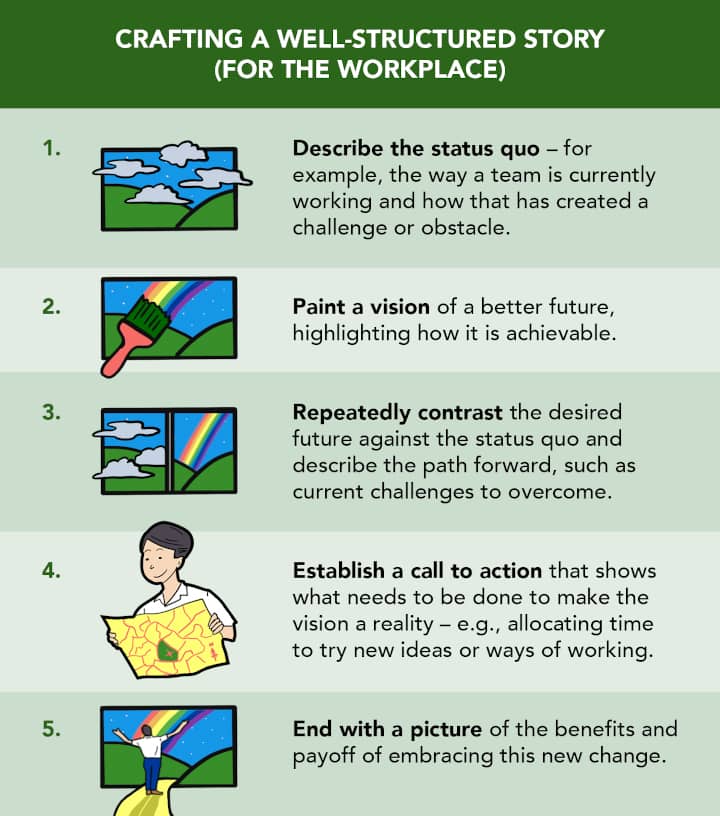Storytelling That Sparks Change

The English primatologist Jane Goodall once said: “If one wants to change attitudes, you have to reach the heart… by telling stories, not by arguing with people’s intellects.”
A passionate animal welfare advocate, Goodall is remembered not for spouting statistics or referencing reports but for her powerful stories about caring for primates.
Whether it’s due to cognitive bias or personal pride, the truth is that facts don’t always change behaviours. Stories, on the other hand, can make information feel less like a lecture and more like a lived experience. A well-crafted story has the power to make facts and information relatable, and engage the audience's imagination.
In the workplace, stories may be used intentionally. In his book The Leader’s Guide to Storytelling, management expert Steve Denning explains that leaders use different story types for different purposes. These include stories that spark action, stories to foster collaboration and stories to lead people into the future.
A good story has several characteristics for various situations and audiences:

Be Relatable
When we listen to and understand a story, our brain waves start to synchronise with that of the speaker. Our brain responds as if we are actually experiencing the events in the story, allowing us to see things from the speaker’s perspective.
To make your story relatable, highlight an element that the listener can identify with. This could be a problem or challenge you know they may have experienced or still struggle with. Understanding your audience and doing some research is crucial in crafting a story that truly resonates.
Be Authentic
The most memorable stories convey all the messiness and imperfections of real life, not a rose-tinted version. Authenticity draws listeners in and lets them connect with the storyteller on a deeper level.
When motivational speakers share personal anecdotes, these tend to centre around how they overcame challenges and found success. The vulnerability and authenticity of such personal stories make them relatable and captivating.
While it is good to be open about your struggles, do not put too much emphasis on them. According to Denning, stories with negative messaging generally fail to inspire action. Aim to show the lessons learnt or positive outcomes by the end of the tale. A compelling story should offer hope and a sense of possibility, leaving the audience feeling motivated to act – whether it is to change one’s habits or learn a new skill.
Give It Structure
Crafting a well-structured story is essential for making it memorable and impactful.
Good orators such as Martin Luther King Jr. use storytelling techniques to structure their speeches. One technique, says Nancy Duarte, author of several books on workplace presentations, is to repeatedly contrast the status quo (what it is now) and their vision for the future (what could be).
In the workplace, this storytelling technique can help to open minds to change – for example, by encouraging a team to embrace a new way of working:

Evoke Emotions
In the workplace, stories for leadership or business objectives should be grounded in data and facts. However, these facts can be conveyed in a way that resonates with the audience on a deeper level.
A story that inspires change goes beyond conveying the material benefits. It should evoke emotions and demonstrate personal growth or a positive transformation.
For instance, a story about quitting a bad habit should not only convey the improved quality of life in numbers. It should also show how the person became happier or approached life more positively as a result of the change.
By combining data with emotional elements, you create a story that is both informative and inspiring. This helps the listener to understand the logical reasons behind the change while also connecting with the emotional aspect of the story, creating impact.
So the next time you want to convince someone to change, try adding a dose of storytelling to your approach.

For more stories like this, subscribe to the Challenge newsletter or follow the Challenge Telegram channel.
- POSTED ON
Aug 23, 2023
- TEXT BY
HS
- ILLUSTRATION BY
mushroomhead








